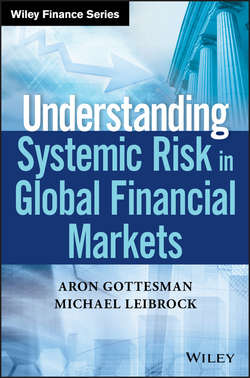Читать книгу Understanding Systemic Risk in Global Financial Markets - Gottesman Aron - Страница 9
На сайте Литреса книга снята с продажи.
CHAPTER 1
Introduction to Systemic Risk
WHAT IS SYSTEMIC RISK?
ОглавлениеThe area of systemic risk analysis is still in its very nascent stages and there currently is no single, universally accepted definition employed by those involved in analyzing and monitoring systemic risk. Moreover, as research on this topic evolves over time, it is likely that existing definitions will morph or that new definitions will be put forth by the various constituents who have an interest in this topic. Furthermore, it is important to note that having a single definition of systemic risk is not a prerequisite for studying and enhancing one's knowledge of this topic or benefiting from some of the existing approaches to measuring and monitoring systemic risks covered in this book. To provide some context and a foundation for the remainder of this book, listed here are examples of some definitions publicly communicated in recent years by well-known regulators and academics:
● “Systemic risks are developments that threaten the stability of the financial system as a whole and consequently the broader economy, not just that of one or two institutions.”1
● “In the context of our economic environment, systemic risk is the threat that developments in the financial system can cause a seizing up or breakdown of this system and trigger massive damages to the real economy. Such developments can stem from the failure of large and interconnected institutions, from endogenous imbalances that add up over time, or from a sizable unexpected event.”2
● “Systemic Risk is the risk of a disruption in the market's ability to facilitate the flows of capital that results in the reduction in the growth of GDP globally.”3
● “One or more global financial centers are mired in a severe crisis that spans two or more distinct regions, with at least three countries impacted in each region. There must also be a corresponding and significant impact on a composite GDP index.”4
● “A risk of disruption to financial services that (i) is caused by an impairment of all or parts of the financial system and (ii) has the potential to have serious negative consequences for the real economy. Fundamental to the definition is the notion of negative externalities from a disruption or failure in a financial institution, market or instrument.”5
● “Systemic risk emerges when the financial sector as a whole has too little capital to cover its liabilities. This leads to widespread failure of financial institutions and/or the freezing of capital markets, which greatly impairs financial intermediation, both in terms of the payment systems and in terms of lending to corporates and households.”6
● “Credit risk, liquidity risk, market risk and operational risk are often difficult to quantify, and more so when the interaction of different types of risk leads to systemic risks. Systemic risks affect a financial system's stability when idiosyncratic shock to an individual financial institution generates contagious effects on others in the system.”7
One common aspect of these definitions is that to be characterized as a systemic threat, the underlying risk(s) should have the potential to severely impact the financial system and real economy. In contrast to the characteristics of a systemic event, an event that might not rise to the level of a systemic risk is one that may have a significant impact on an industry sector or geographic region, but does not spill over into the broad economy. For purposes of this book we will treat the terms systemic event and financial crisis as synonymous.
1
Ben Bernanke in a letter to Senator Bob Corker, dated Oct. 30, 2009.
2
Text of the Clare Distinguished Lecture in Economics and Public Policy by Mr. Jean-Claude Trichet, President of the European Central Bank, organized by Clare College, University of Cambridge, Cambridge, Dec. 10, 2009.
3
Fouque, J.P., and Langsam J., 2013, Handbook of Systemic Risk. Cambridge University Press, 2013, p. xxi.
4
Reinhart, Carmen M., and Rogoff, Kenneth S., 2009, This Time Is Different: Eight Centuries of Financial Folly. Princeton, NJ: Princeton University Press.
5
www.fsb.org/what-we-do/policy-development/systematically-important-financial-institutions-sifis/.
6
Acharya, V.V., Pedersen, L.H., Philippon, T., and Richardson, M., 2010, “Measuring Systemic Risk.” Working paper, New York University Stern School of Business.
7
International Monetary Fund, 2000.
